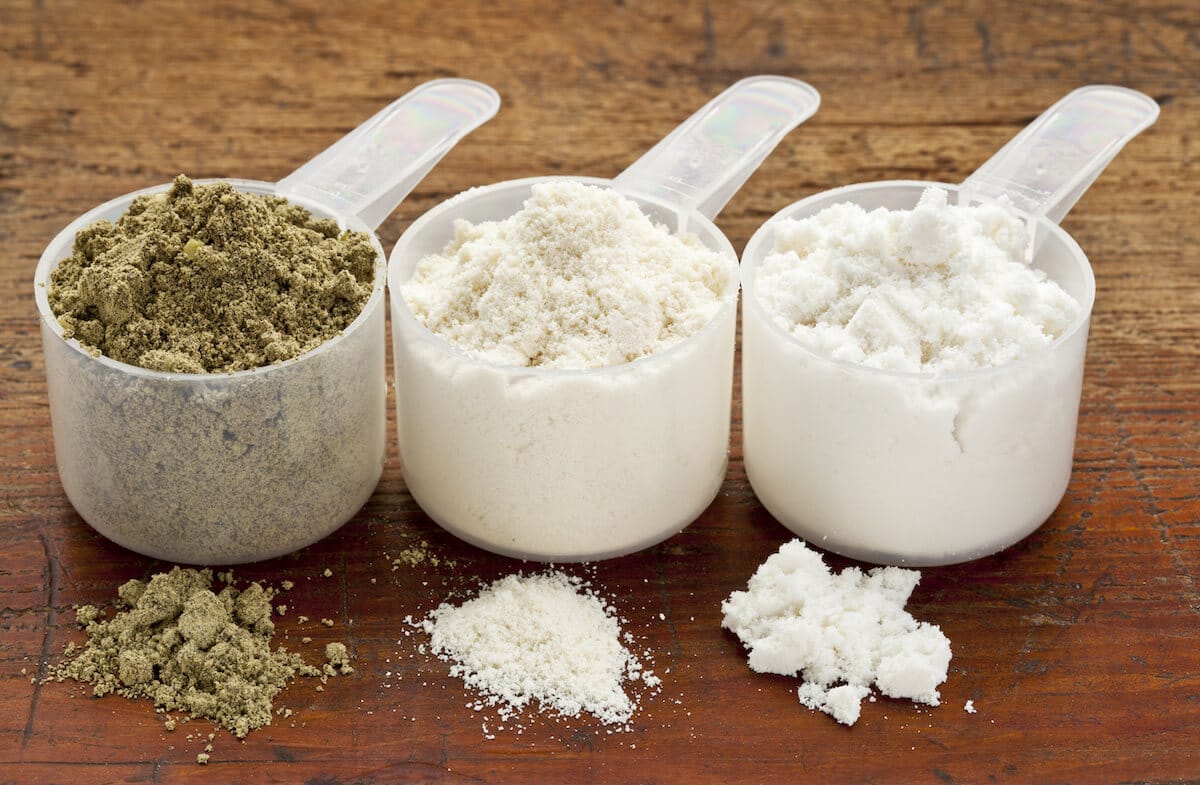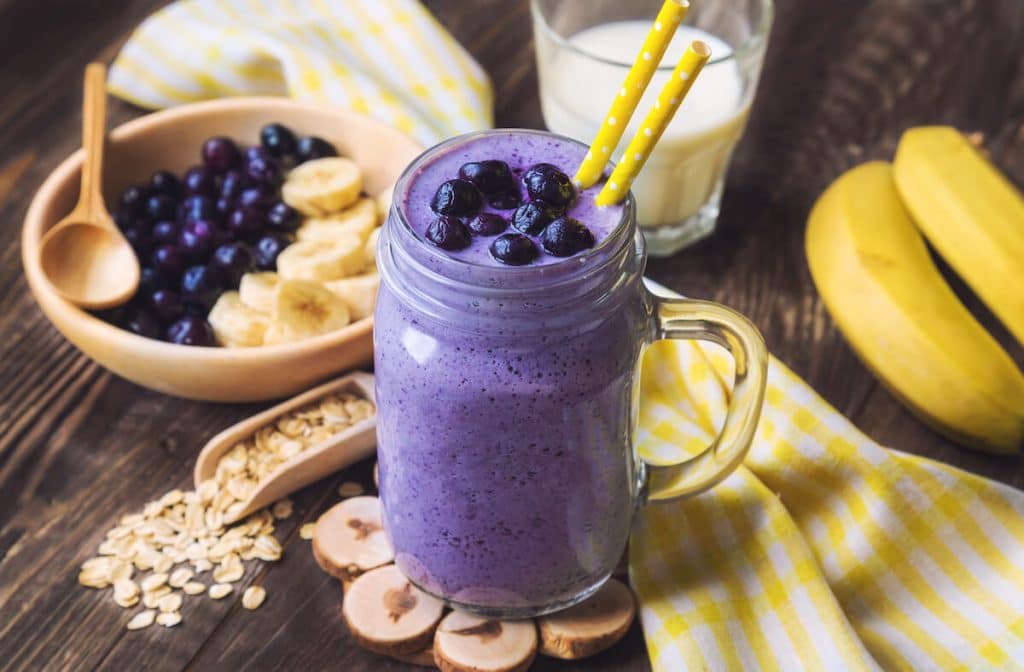
19 Oct Understanding Low-Calorie Protein Powder and What It Can Do for You
If you’ve been shopping for protein supplements recently, you may have noticed products labeled “low-calorie protein powder.” The question is: How is low-calorie protein powder different from regular protein powder? Or is it just a marketing ploy aimed at dieters desperate enough to try anything?
Let’s look at what a low-calorie protein powder actually is, how you can benefit from it, and how to use it. Then you can decide if it’s the right product for you.
Why You Need Protein
There are three essential macronutrients you need if you want to optimize your health: protein, carbohydrates, and fat. Protein is critical to help you build muscle, bones, and organs, and to keep your immune system healthy.
When you consume protein, your digestive system breaks it down into essential amino acids. These amino acids, particularly the branched-chain amino acids (BCAAs), are essential for muscle protein synthesis — in other words, muscle growth and maintenance.
This may be especially important to you if you’re involved in athletics or bodybuilding. You need protein to build and maintain lean muscle to support your athletic performance or for building muscle mass if you’re specifically focused on muscle gain. Protein also gives you energy, which is vital when training intensively.
Protein is also important for healthy aging, as protein and resistance training together help to reduce the muscle loss that occurs naturally as we get older. It’s more difficult for mature bodies to add extra muscle, which means you need to hold on to what you’ve got as long as possible.
What’s more, if you’re following a keto diet, want to lose weight or better manage your blood pressure, blood sugar, or cholesterol, protein can help support all those goals.
How Much Protein You Need
To decide on the amount of protein you need to optimize your health, it’s important to take into account several factors, including your stage of life, activity level, and personal health and wellness goals.
The recommended dietary allowance (RDA) for an average, moderately active person is 0.8 grams of protein per kilogram of body weight. However, if you’re an older adult who is starting to lose muscle mass, your protein intake should be closer to 1.5 grams. If you’re extremely active or looking to build a lot of muscle, you may need at least 2 grams per kilogram — more if you’re an endurance athlete.
If you have any other health concerns, you should consult a dietitian or other health professional before substantially increasing your protein intake.
What Is a Low-Calorie Protein Powder?
It’s important to note upfront that just because a supplement is labeled “low-calorie” doesn’t automatically mean you’re going to lose weight. There are many other factors involved, including the rest of your nutrition and your level of exercise versus the calories you take in.
Equally important is to understand that the label doesn’t necessarily tell the whole truth. According to FDA regulations, a product can only claim to be “low-calorie” if it contains fewer than 40 calories per serving size of at least 30 grams — which, as you will see below, is nigh-on impossible for a protein powder with any decent protein content. And a “reduced-calorie” product must contain at least 25% fewer calories than other similar products.
In short, it helps to know what you’re looking for when deciding how seriously to take the marketing for any particular product.
That said, protein powder supplements come in many different forms and some of them are higher in fat (and therefore calories) than others.
Protein, Carbs, Fat, and Calorie Counts
Let’s look at how protein, carbs and fat compare in terms of calorie count:
- 1 gram of protein = 4 calories
- 1 gram of carbs = 4 calories
- 1 gram of fat = 9 calories
Essentially the less fat a supplement contains, the lower the calorie count will be.
Bear in mind too that although 1 gram of carbs and 1 gram of protein contain the same number of calories, protein is generally considered far more useful when it comes to athletic performance and muscle building — with the exception of any carb loading you may need to do for endurance events, of course. Also, if you’re following a keto diet, you’ll be looking to reduce carbs wherever you can.
So what you’re really looking for in a “low-calorie protein powder” is high protein content.
For example, whey protein isolate and whey protein concentrate are both dairy-based supplements. But because whey protein isolate is refined further, it’s lower in fat (and carbs too) than whey protein concentrate and therefore lower in calories.
Calories can also come from other additives like sugar or gluten, which may be added as fillers or to improve taste — look for a high-quality protein supplement that avoids these ingredients.
Essentially, a low-calorie protein powder is one that’s packed with the most protein and the least fat and carbs. The higher the percentage of protein, the more bang you’ll get for your buck — without unnecessary calories being added into the mix.
Ideally, your low-calorie protein powder should include a few grams of fiber as well though, as this feeds the healthy bacteria in your system, helping your body to digest food well.
Benefits of Low-Calorie Protein Powder

If you’re using a lot of energy every day, you’re managing your weight, or you’re struggling to get enough protein from your diet for other reasons, a low-calorie protein powder can work wonders to fill the gap.
Bear in mind though that you shouldn’t use protein powder as your only source of nutrition. You also need a range of nutrients from a variety of whole foods to make sure your body functions properly.
Low-Calorie Protein Powder for Athletes and Bodybuilders
As an athlete or a bodybuilder in a cutting phase, there’s a good chance you’re counting your macros. You definitely don’t want to sacrifice protein as that’s what keeps your muscles in shape and prevents muscle breakdown. Instead, you want all the muscle power you can get from your protein but without extra carbs or fat.
Of course, you may choose to add some carbs and fat to your protein shake or smoothie, along with your low-calorie protein powder, to provide extra fuel and support your post-workout recovery — but you get to control that when you know your base protein is as pure as possible.
Low-Calorie Protein Powder for Keto
If you’re following a keto diet, your goal will be to boost your protein and keep your carbs as low as possible. Luckily, a low-calorie protein powder, almost by definition, is low-carb and low-sugar, so it should fit very well into your meal planning.
Low-Calorie Protein Powder for Weight Loss
If your goal is to reduce body weight and/or fat mass, a low-calorie protein powder supports that in many ways.
For starters, it’s high-protein, which has shown to assist with weight loss, especially if you’re exercising too. It’s also low-calorie, which means there are fewer calories to get through before your body starts burning fat for fuel. Protein speeds up your metabolism too, again helping you to burn more fat, even while you’re resting. It’s also well-known for providing a sense of satiety, which reduces cravings and helps with appetite regulation.
Finally, even if you simply want to ensure you get optimum nutrition to support a normal busy day, a low-calorie protein supplement can serve as a high-quality protein source or even as a meal replacement in a pinch.
Types of Protein Powder
Protein powder supplements come in many different forms and can be animal- or plant-based. This gives you a lot of choice in fulfilling your particular dietary needs.
Animal-Based Protein Powder Supplements
Animal protein sources are usually complete proteins — meaning they provide all the essential amino acids your body requires. If you’re comfortable with consuming animal products, and particularly if you’re looking to build muscle, these may be the way to go.
Animal protein supplements include:
- Whey protein powder, including whey protein concentrate, isolate, or hydrolysate
- Casein
- Collagen
- Egg white protein
Vegan Protein Powder Supplements
If you’re vegan by choice or if your body doesn’t tolerate animal products, there are many vegan protein supplements on the market. Plant-based protein powders may not be complete proteins in themselves, but when they’re consumed with complementary proteins, it’s quite possible to get the full range of essential amino acids. To achieve this, they’re often sold as protein blends.
Some examples of plant proteins include:
- Brown rice protein
- Pea protein
- Soy protein
- Hemp protein
Because the protein content of plant proteins often isn’t as high as animal-based proteins, some may consider them less effective. However, the latest technology has changed all that.
It’s now possible to get a pea protein powder that is just as effective as whey protein powder. Ingredient Optimized ioPea Protein is scientifically proven to be three times more bioavailable than non-optimized pea protein, which means your body can effectively absorb and use it.
How Do You Know It’s Low-Calorie Protein Powder?
To find the best protein powders that are also low-calorie, you need to read product labels and do your research. First and foremost, check how much protein you’re getting for your calorie count. The closer to 100% protein content you can get — in other words, the more grams of protein for the same serving size — the fewer calories you’ll be getting from other sources like carbohydrates and fats.
Also, check that it contains no added sugar or artificial sweeteners. A sweetener like sucralose might contain almost no calories but it’s still been through a chemical process. If you must have a sweetened protein powder, opt for natural sweeteners like stevia or monk fruit.
If you want a gold-standard protein powder that’s good for you, make sure the product contains no fillers or other unnecessary additives (such as artificial colors or flavors), and that it’s gluten-free, lactose-free, soy-free, and preservative-free.
Ingredient Optimized ioWhey Protein checks all these boxes and more. It’s been scientifically proven that because this protein is so much more bioavailable, you need fewer grams of supplement — which equates to 26% fewer calories — to get the same benefit. It delivers all the nutritional impact you need and gives your metabolism a boost while helping you manage your weight.
How to Use Protein Powder in a Protein Shake

Protein powders can be unflavored but they also come in interesting variations like chocolate, berry, or vanilla flavor. You can simply blend them with different liquids — water, milk, almond milk, soy milk, coconut milk, kefir, or yogurt — and end up with a protein shake or smoothie that tastes reasonably good.
Even the best-tasting protein powders can get a bit boring though. To really enjoy them while also getting your pre-workout or post-workout protein boost, try adding extra ingredients to your protein shake. These can change up the taste and also give your shake an extra dose of nutrients.
You may want to add:
- Banana
- Spinach or kale
- Berries
- Tofu
- Oats
- Quinoa
- Raw cacao or cacao nibs
- Almond or peanut butter
- Flaxseed
- Chia seeds
- Hemp seeds
- Pumpkin seeds
- Sesame seeds
Of course, if your goal is to manage your weight, you’ll want to be careful not to add too many other ingredients that are high in fat or carbs to your drink. You can also add low-calorie protein powder to many other foods including oats, soups, stews, mashed vegetables, protein cookies, or pancakes.
You’re really only limited by your imagination and your personal taste, so experiment to see what truly boosts your enjoyment level.
Low-Calorie Protein Powder Can Help You Meet Your Health Goals
The best low-calorie protein powder has the highest protein content you can find — with the fewest calories. It helps you build and maintain muscle while also managing your weight.
Low-calorie protein powder is available in several different forms and it’s important to do your research when deciding which brand to buy. The highest-quality products will help you achieve all the health and wellness results you’re looking for and more.


